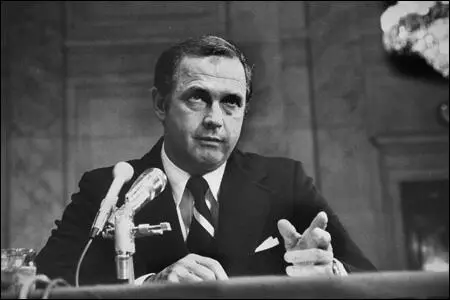On this day on 23rd October
On this day in 1642 the Battle of Edgehill is the first major battle of the English Civil War. The battle began at 3 o'clock in the afternoon of the 23rd October. Prince Rupert and his Cavaliers made the first attack and easily defeated the left-wing of the Parliamentary forces. Henry Wilmot also had success on the right-wing but Sir Philip Stapleton and Oliver Cromwell were eventually able to repel the attack. Colonel Nathaniel Fiennes, later recalled that Cromwell "never stirred from his troops" and fought until the Cavaliers retreated.
Prince Rupert's cavalrymen lacked discipline and continued to follow those who ran from the battlefield. John Byron and his regiment also joined the chase. The royalist calvary did not return to the battlefield until over an hour after the initial charge. By this time the horses were so tired they were unable to mount another attack against the Roundheads. The fighting ended at nightfall. Neither side had one a decisive advantage. A pamplet published at the time commented: "The field was covered with the dead, yet no one could tell to what party they belonged... Some on both sides did extremely well, and others did ill and deserved to be hanged."
The Earl of Essex decided to withdraw his men to Warwick. This left the Royalists free to march on London. Prince Rupert was all for a swift advance on the capital, but the King, shocked by the slaughter he had witnessed, moved only slowly south-east before deciding to make his way to Oxford, which became his headquarters for the duration of the war.
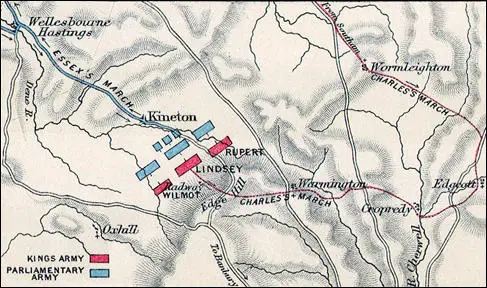
On this day in 1850 the first National Women's Rights Convention begins in Worcester, Massachusetts. It was organized by Elizabeth Cady Stanton and Lucretia Mott. Stanton's resolution that it was "the duty of the women of this country to secure to themselves the sacred right to the elective franchise" was passed, and this became the focus of the group's campaign over the next few years. In 1866 Mott joined with Stanton and Lucy Stone to establish the American Equal Rights Association. The following year, the organisation became active in Kansas where Negro suffrage and woman suffrage were to be decided by popular vote.
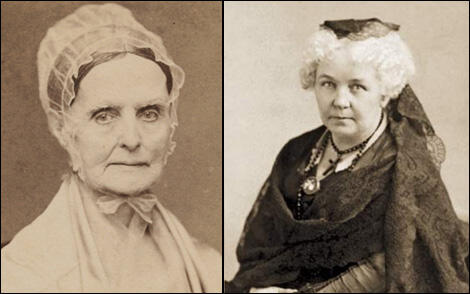
On this day in 1906 members of the Women's Social and Political Union including Emmeline Pethick-Lawrence, Annie Kenney, Mary Gawthorpe, Dora Montefiore, Teresa Billington-Greig, Edith How-Martyn, Hannah Mitchell, Adela Pankhurst and Minnie Baldock are arrested for trying to make speeches in the lobby of the House of Commons.
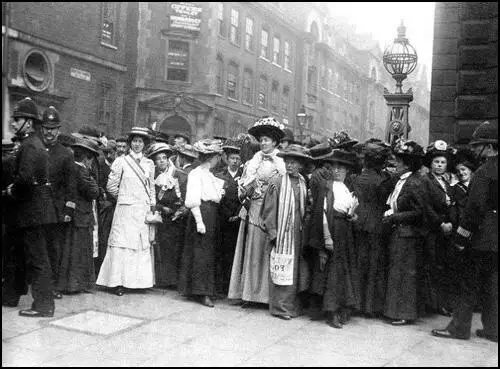
On this day in 1940 Adolf Hitler and Francisco Franco meet at Hendaye to discuss the possibility of Spain entering the Second World War. Franco joined the Anti-Comintern Pact on 7th April 1938 but declared the neutrality of Spain on the outbreak of the war. Hitler tried hard to get Franco to change his mind. In their negotiations Franco demanded that in any postwar settlement he wanted control of Gibraltar, French Morocco, a portion of Algeria including Oran, and parts of Africa.
Franco's main demand was that Germany had to fully compensate Spain for the cost of any British blockade of the country. Hitler was in no position to take on this burden and the negotiations came to an end. However, Franco did agree to provide logistical and intelligence support and promised to send a volunteer force, the Spanish Blue Division, to help the fight against communism in Europe.
After the defeat of France in May 1940, Hitler resumed negotiations with Franco. The two men met at Hendaye on 23rd October 1940. Hitler's main request was for his troops to travel through Spain to link up with an airbourne assault in Gibraltar. Franco, who believed that Germany would not win a long war, refused. Instead, he asked for arms so that Spain could capture Gibraltar. Afterwards Hitler remarked that he would rather visit the dentist to have his teeth removed than have another meeting with Franco.
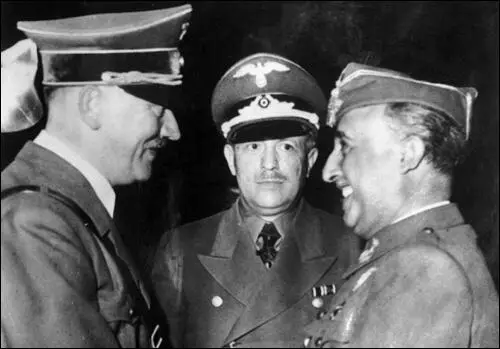
On this day in 1942 allied forces commence the second ampaign at El Alamein. General Bernard Montgomery launched Operation Lightfoot with the largest artillery bombardment since the First World War. The attack came at the worst time for the Deutsches Afrika Korps as Erwin Rommel was on sick leave in Austria. His replacement, General George Stumme, died of a heart-attack the day after the 900 gun bombardment of the German lines. Stume was replaced by General Ritter von Thoma and Adolf Hitler phoned Rommel to order him to return to Egypt immediately.
The Germans defended their positions well and after two days the Eighth Army had made little progress and Bernard Montgomery ordered an end to the attack. When Erwin Rommel returned he launched a counterattack at Kidney Depression (27th October). Montgomery now returned to the offensive and the 9th Australian Division created a salient in the enemy positions. Winston Churchill was disappointed by the Eighth Army's lack of success and accused Montgomery of fighting a "half-hearted" battle. Montgomery ignored these criticisms and instead made plans for a new offensive, Operation Supercharge.
On 1st November 1942, Montgomery launched an attack on the Deutsches Afrika Korps at Kidney Ridge. After initially resisting the attack, Rommel decided he no longer had the resources to hold his line and on the 3rd November he ordered his troops to withdraw. However, Adolf Hitler overruled his commander and the Germans were forced to stand and fight.
The next day Montgomery ordered his men forward. The Eighth Army broke through the German lines and Erwin Rommel, in danger of being surrounded, was forced to retreat. Those soldiers on foot, including large numbers of Italian soldiers, were unable to move fast enough and were taken prisoner. For a while it looked like the the British would cut off Rommel's army but a sudden rain storm on 6th November turned the desert into a quagmire and the chasing army was slowed down. Rommel, now with only twenty tanks left, managed to get to Sollum on the Egypt-Libya border.
The British Army recaptured Tobruk on 12th November, 1942. During the El Alamein campaign half of Rommel's 100,000 man army was killed, wounded or taken prisoner. He also lost over 450 tanks and 1,000 guns. The British and Commonwealth forces suffered 13,500 casualties and 500 of their tanks were damaged. However, of these, 350 were repaired and were able to take part in future battles.
Winston Churchill was convinced that the battle of El Alamein marked the turning point in the war and ordered the ringing of church bells all over Britain. As he said later: "Before Alamein we never had a victory, after Alamein we never had a defeat."
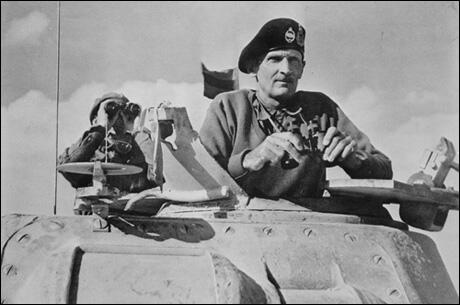
On this day in 1956 secret police shoot several protesters in Budapest starting the Hungarian Revolution. The students demanded an end to Soviet occupation and the implementation of "true socialism". The police made some arrests and tried to disperse the crowd with tear gas. When the students attempted to free those people who had been arrested, the police opened fire on the crowd.
The following day commissioned officers and soldiers joined the students on the streets of Budapest. Stalin's statue was brought down and the protesters chanted "Russians go home", "Away with Gero" and "Long Live Nagy". The Central Committee of the Hungarian Communist Party respond to these developments by deciding that Imre Nagy should become head of a new government.
On 25th October Soviet tanks opened fire on protesters in Parliament Square. One journalist at the scene saw 12 dead bodies and estimated that 170 had been wounded. Shocked by these events the Central Committee of the Communist Party forced Erno Gero to resign from office and replaced him with Janos Kadar.
Imre Nagy now went on Radio Kossuth and announced he had taken over the leadership of the Government as Chairman of the Council of Ministers." He also promised the "the far-reaching democratization of Hungarian public life, the realisation of a Hungarian road to socialism in accord with our own national characteristics, and the realisation of our lofty national aim: the radical improvement of the workers' living conditions."
On 28th October, Nagy and a group of his supporters managed to take control of the Hungarian Communist Party. At the same time revolutionary workers' councils and local national committees are formed all over Hungary. On 30th October, Imre Nagy announced that he was freeing Cardinal Joseph Mindszenty and other political prisoners. He also informs the people that his government intends to abolish the one-party state. This is followed by statements by Zolton Tildy, Anna Kethly and Ferenc Farkas concerning the reconstitution of the Smallholders Party, the Social Democratic Party and the Petofi Peasants Party.
Nagy's most controversial decision took place on 1st November when he announced that Hungary intended to withdraw from the Warsaw Pact. as well as proclaiming Hungarian neutrality he asked the United Nations to become involved in the country's dispute with the Soviet Union.
On 3rd November, Nagy announced details of his coalition government. It included communists (Janos Kadar, George Lukacs, Geza Lodonczy), three members of the Smallholders Party (Zolton Tildy, Bela Kovacs and Istvan Szabo), three Social Democrats (Anna Kethly, Gyula Keleman, Joseph Fischer), and two Petofi Peasants (Istvan Bibo and Ferenc Farkas). Pal Maleter was appointed minister of defence.
Nikita Khrushchev, the leader of the Soviet Union, became increasingly concerned about these developments and on 4th November 1956 he sent the Red Army into Hungary. Soviet tanks immediately captured Hungary's airfields, highway junctions and bridges. Fighting took place all over the country but the Hungarian forces were quickly defeated.
It is estimated that about 3,000 Hungarians were killed during the uprising. About 12,000 were arrested and imprisoned. Of these, between 400 and 450 were executed. An estimated 200,000 people managed to escape to the West.
Janos Kadar promised Nagy and his followers safe passage out of the country. Kadar did not keep his promise and on 23rd November, 1956, Nagy and his followers, were kidnapped after leaving the Yugoslav embassy. On 17th June 1958, the Hungarian government announced that several of the reformers had been convicted of treason and attempting to overthrow the "democratic state order" and Imre Nagy, Pal Maleter and Miklos Gimes had been executed for these crimes. Geza Lodonczy and Attila Szigethy were both to die in suspicious circumstances soon afterwards.
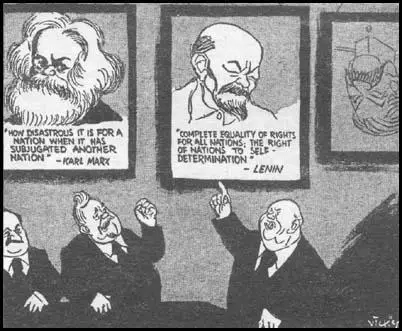
Victor Weisz, Daily Mirror (November, 1956)
On this day in 1973 President Richard Nixon agrees to turn over subpoenaed audio tapes of his Oval Office conversations. The authorities became aware of these tapes when Alexander Butterfield, who was in charge of Nixon's "internal security", provided this information in an interview on 13th July. Late that night, Bob Woodward received a telephone call from the investigator: "We interviewed Butterfield. He told the whole story. Nixon bugged himself." Bradlee commented in his memoirs: "The death knell of Richard Nixon was tolling."
The Special Prosecutor now demanded access to these tape-recordings. At first Nixon refused. Carl Bernstein began calling sources at the White House: "Four of them said they had learned that the tapes were of poor quality, that there were gaps in some conversations. But they did not know whether these had been caused by erasures. Ron Ziegler told Bernstein there were no gaps or erasures in the tapes. However, on 21st November, Nixon's lawyers admitted that one of the tapes had a gap of over 18 minutes.
The Supreme Court ruled against Nixon and members of the Senate began calling for him to be impeached over the Watergate issue, he changed his mind. However, some tapes were missing while others contained important gaps. Under extreme pressure, Nixon supplied tape scripts of the missing tapes.Nixon's secretary, Rose Mary Woods, denied deliberately erasing the tape. It was now clear that Nixon had been involved in the cover-up and members of the Senate began to call for his impeachment.
On 9th August, 1974, Richard Nixon became the first President of the United States to resign from office. Nixon was granted a pardon but other members of his staff involved in helping in his deception were imprisoned. Nixon was granted a pardon but several members of his staff involved in the cover-up were imprisoned. This included: H. R. Haldeman, John Ehrlichman, Charles Colson, John Dean, John N. Mitchell, Jeb Magruder, Egil Krogh, Frederick LaRue, Robert Mardian and Dwight L. Chapin.
